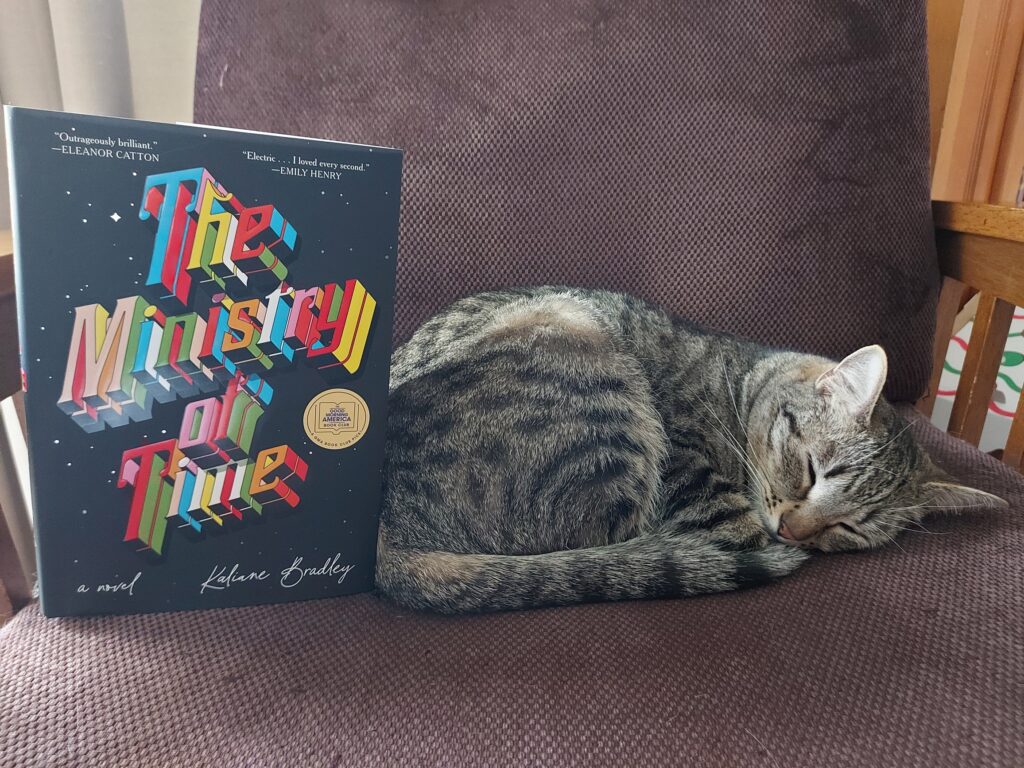The Ministry of Time by Kaliane Bradley

The Ministry of Time is Kaliane Bradley’s debut novel. I love time travel stories, and there has been a lot of buzz around this book, so I decided to buy it. I absolutely loved The Ministry of Time and can see it on my short list of favourite books of 2024. I made the mistake of going onto Goodreads (ugh) and checking out the reviews on there, and I am baffled by the number of one-star reviews, as well as the false accusations of plagiarism against this book because it shares the same name as the Spanish TV show El Ministerio del Tiempo. As someone who has seen El Ministerio del Tiempo AND read The Ministry of Time, I can assure you that there is no plagiarism involved. Both are delightful to watch/read.
The Ministry of Time is set in London in the near future when climate change is getting worse. I mention climate change because it actually ends up playing an important role in the events of the novel. The novel’s protagonist, who is never named, is a woman of mixed British-Cambodian descent (like the author). She takes a job in a top-secret government ministry that has discovered time travel and is gathering “expats” from across history to figure out whether people can survive time travel and if time travel will affect the space-time continuum.
One such expat is “1847”, as he is known in the ministry, but to history he is Commander Graham Gore, who died during Franklin’s doomed expedition to the Arctic (yes, Gore was a real person). The protagonist’s job is to act as a “bridge” between Gore and the post-colonial future, basically living with him and assisting him with life in the modern world.
Gore is a charming character whose life as an explorer makes him better equipped to deal with the changes in society and technology, as well as living with a mixed-race woman (on the other hand, a different expat, from the 17th century, is outright hostile towards the protagonist). So of course, the protagonist cannot help but fall in love with him. And this is what I love about The Ministry of Time, that it is a romance about two people thrown together in an extraordinary situation and the reader gets to follow along as they get to know each other intimately.
The Ministry of Time is not just a sci-fi romance, though, and thankfully it doesn’t get bogged down in the mechanics of time travel. It also explores issues of gender and race, as well as the past’s affect on the future. It is also a bit of a spy novel as the protagonist crosses paths with two suspicious characters and realizes that there is more to the ministry than just bringing expats to the future.
The part of time travel that I have always been curious about is the whole “fish out of water” aspect of bringing someone from the past into the present. How would they adapt? Or would they not adapt? I feel that Bradley did a good job with her characterization of the expats and their adaptation to modern London. My favourite expat is Margaret Kemble, another 17th century expat, who learns how to use Tinder while still spouting 17th century idioms. And I like the protagonist, who reads like a normal person with a high stakes government job – she does not have any secret spy skills, and she doesn’t necessarily keep cool under pressure. She reacts like how most other people would if someone was trying to kill them: by having a meltdown. She is so naïve, you cannot help but shake your head and wonder how she even got the job as Gore’s bridge in the first place (it makes sense by the end of the novel), but she is endearing.
There is much foreshadowing by the protagonist that things do not end up well for her and Gore that I thought for sure that I was going to have a Tomorrow, and Tomorrow, and Tomorrow situation on my hand, but even though this novel ended up going in a direction I did not expect, I thought the conclusion to The Ministry of Time was satisfying.